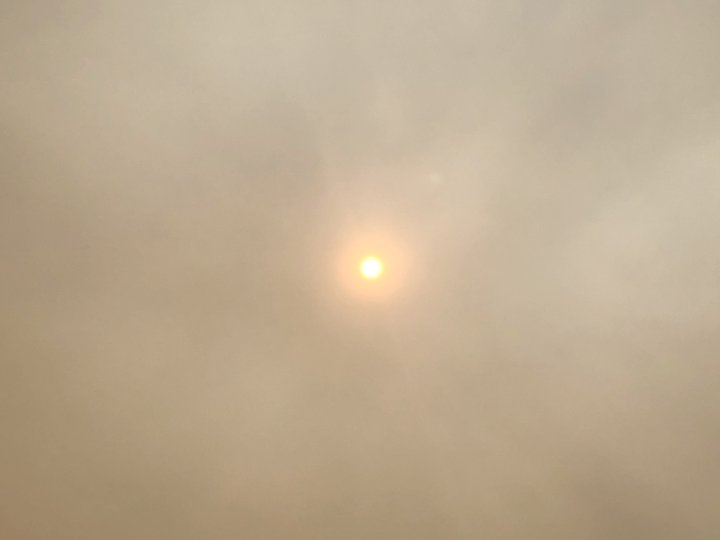
The sun, partially obscured by smoke in Eureka Tuesday afternoon.
###
Smoke from several wildfires burning across the region has rendered the air unhealthy in much of Humboldt County, according to a public service announcement issued Tuesday by the North Coast Unified Air Quality Management District and various partner agencies.
Air quality advisories have been issued for inland communities including Willow Creek, Hoopa, Orleans and Weitchpec, where today’s air quality index is considered “unhealthy,” according to the announcement. That means some members of the general public could experience health effects while members of sensitive groups, such as those with asthma or heart disease along with young children, are advised to avoid prolonged or heavy outdoor exertion.
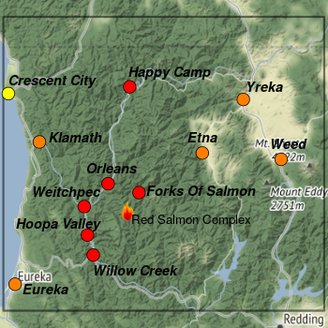
Image via IWFAQRP.
“Heavy smoke from the Red Salmon Complex will be transported off to the west and southwest of the fire today due to
the strong northeast winds over the region,” the warning reads.
In Eureka and the larger Humboldt Bay region, today’s air quality was expected to be rated “moderate” to “unhealthy for sensitive groups,” depending on conditions.
The public service announcement continues, “Communities in the Klamath River drainage are likely to see heavy smoke impacts throughout the day and into tomorrow. Eureka and the coastal communities may see degrading air quality due to a strong offshore wind that may bring smoke to the surface in that area. Communities to the east of the fire are seeing heavy smoke this morning but should see improvement throughout the day.”
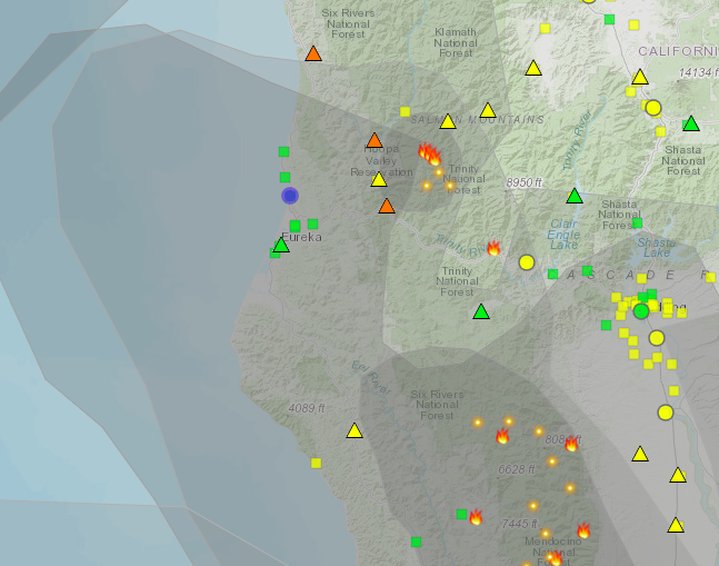
Smoke plume and fire imagery via airnow.gov.
Here’s the full rundown for Humboldt and Del Norte communities:
- Coastal areas – Widespread haze and patchy smoke, but generally Moderate to Unhealthy for Sensitive Groups.
- Eureka - Moderate to Unhealthy for Sensitive Groups depending on conditions.
- Crescent City – Overall Moderate conditions.
- Klamath – Overall expected to have Moderate air quality.
- Orleans & Weitchpec - Overall Unhealthy conditions.
- Hoopa & Willow Creek - Overall Unhealthy conditions.
- Southern Humboldt County - Moderate conditions, with periods of Unhealthy for Sensitive Groups toward the south.
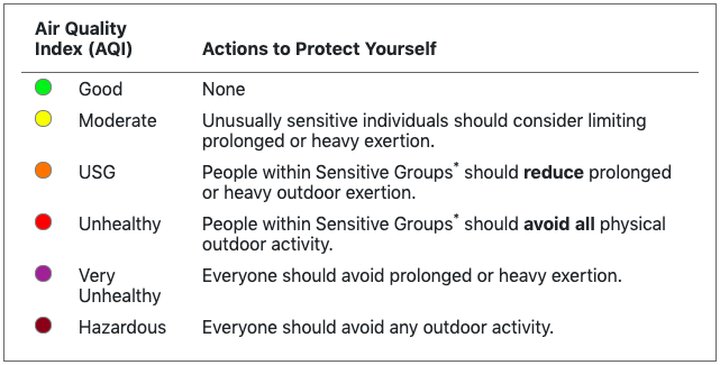
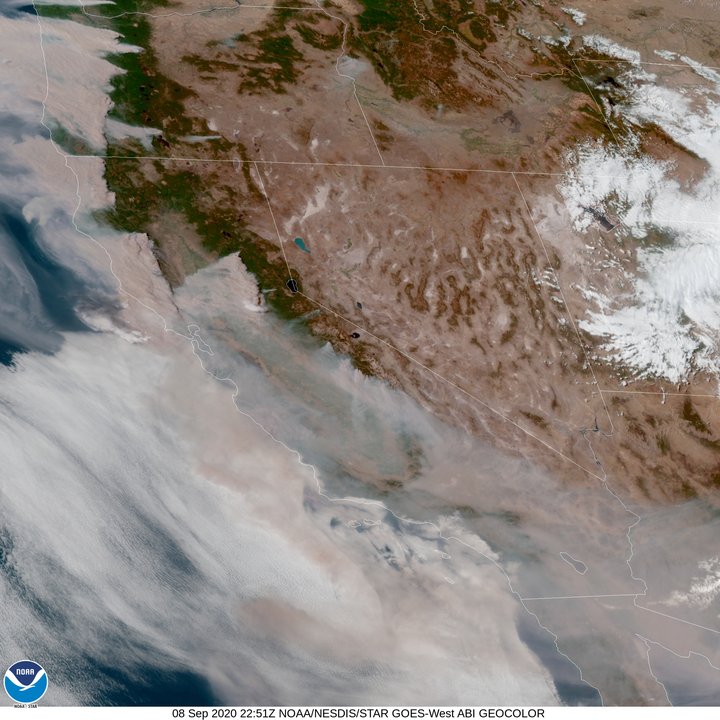
Satellite imagery from the National Oceanic and Atmospheric Administration.
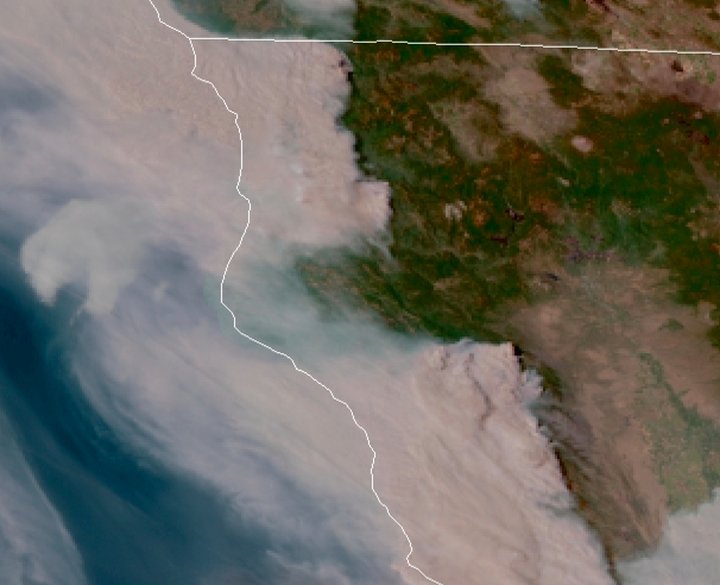
Detail of the North Coast.
More info from the North Coast Unifies Air Quality Management District:
Health Information for Smoke Impacts
Concentrations of smoke may vary depending upon location, weather, and distance from the fire. Smoke from wildfires and structure fires contain harmful chemicals that can affect your health. Smoke can cause eye and throat irritation, coughing, and difficulty breathing. People who are at greatest risk of experiencing symptoms due to smoke include: those with respiratory disease (such as asthma), those with heart disease, young children, and older adults.
These sensitive populations should stay indoors and avoid prolonged activity. All others should limit prolonged or heavy activity and time spent outdoors. Even healthy adults can be affected by smoke. Seek medical help if you have symptoms that worsen or become severe.
Follow these general precautions to protect your health during a smoke event:If you have lung disease (including asthma) or heart disease, closely monitor your health and contact your doctor if you have symptoms that worsen.
- Minimize or stop outdoor activities, especially exercise.
- Stay indoors with windows and doors closed as much as possible.
- Do not run fans that bring smoky outdoor air inside – examples include swamp coolers, whole-house fans, and fresh air ventilation systems.
- Run your air-conditioner only if it does not bring smoke in from the outdoors. Change the standard air conditioner filter to a medium or high efficiency filter. If available, use the “re-circulate” or “recycle” setting on the unit.
- Do not smoke, fry food, or do other things that will create indoor air pollution.
Consider leaving the area until smoke conditions improve if you have repeated coughing, shortness of breath, difficulty breathing, wheezing, chest tightness or pain, palpitations, nausea, unusual fatigue, lightheadedness.
Updated guidance from the CDC is available on reducing wildfire smoke exposure given COVID-19 considerations: https://www.cdc.gov/disasters/covid-19/reduce_exposure_to_wildfire_smoke_covid-19.html.
For further information, visit the District’s website at www.ncuaqmd.org.
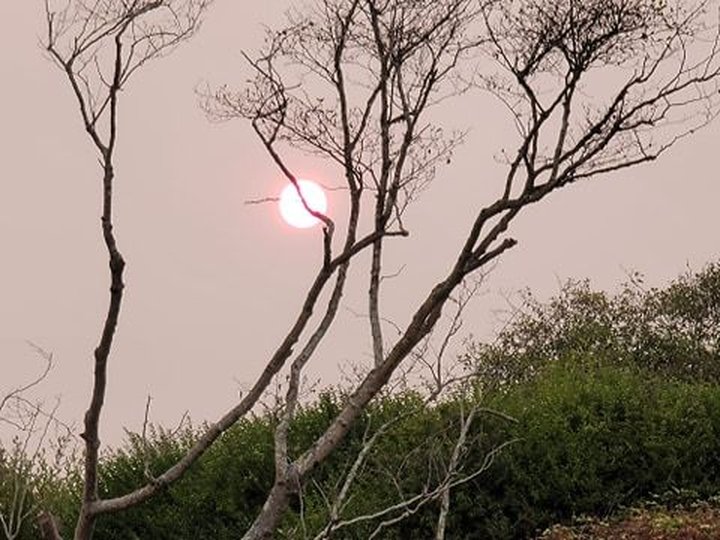
Sunrise in Eureka. | Photo submitted by Kassie Cherie.
CLICK TO MANAGE